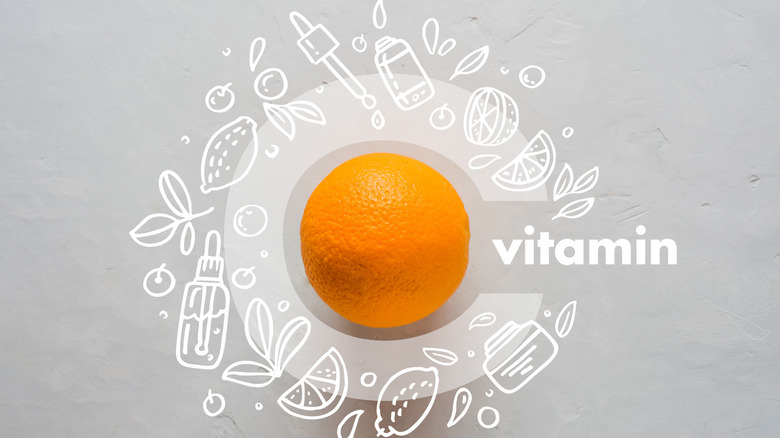Can Vitamin C Play A Role In COVID-19 Severity?
Vitamin C is an essential nutrient that boosts the immune system and helps the body fight off diseases. According to the National Institutes of Health (NIH), getting a lot of vitamin C may reduce a person's risk of cancer and heart disease, and while it doesn't reduce a person's risk of catching colds, it may make colds shorter and less severe.
Some researchers have explored whether vitamin C also has an impact on COVID-19. While the NIH reports that vitamin C deficiency is rare in the general population, a study published in the Nutrition Journal found that up to 82% of critically ill COVID-19 patients have low levels of vitamin C. An earlier survey found that of 18 patients with COVID-related acute respiratory distress syndrome (ARDS), 17 had undetectable low levels of vitamin C, and the other had very low levels (via Critical Care). These are pretty strong numbers, but do they necessarily mean anything?
Vitamin C and COVID-19 data are not conclusive
According to the NIH COVID-19 Treatment Guidelines, there is not enough evidence to recommend for or against the use of vitamin C to treat COVID-19. This is because the data is inconclusive, with some studies showing benefits that others do not. Even the low levels of vitamin C found in critically ill patients with COVID-19 could be because these patients are feeling too sick to eat, concedes the Nutrition Journal. This would make sense, because people get most of their vitamin C from food, according to the NIH.
Regardless of whether vitamin C reduces your risk of COVID-19 complications, it never hurts to make sure you're getting enough vitamin C. If you're an adult, this would be around 75 to 90 milligrams per day, depending on your gender. Just make sure you don't have too much, since the NIH warns that too much vitamin C (above 2,000 mg for adults) can lead to cramps, diarrhea, and nausea.
Of course, don't rely on vitamin C at the expense of protective measures proven to be effective, such as the vaccine or monoclonal antibodies for high-risk people who currently have a mild or moderate case of the virus (per NIH).


